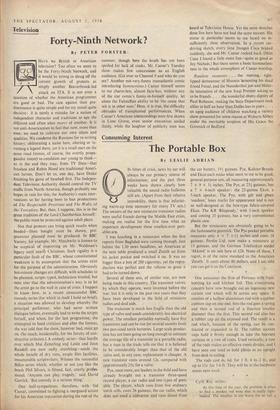Television
Forty-Ninth Network?
By PETER FORSTER HAVE we British or American television? Too often we seem to be the Forty-Ninth Network, and it would be wrong to shrug off the current growth of protests as simply another Beaverbrook-led attack on ITA. It is not even a question of whether the American programmes are good or bad. The case against their pre- dominance is quite simple and (to my mind) quite decisive: it is surely a mistake for a nation of independent character and traditions to ape the different and often alien mores of another. It is not anti-Americanism to feel that now, more than ever, we need to cultivate our own idiom and qualities. We condemn the Russians for re-writing history, obliterating a name here, altering or in- venting a legend there, yet it is a small start on the same road (minus, of course, the overtly propa- gandist intent) to,condition our young to think— as in the end they may, from TV films—that Ivanhoe and Robin Hood are traditional Ameri- can heroes, Don't let us, one day, have Drake finishing his game of baseball first. The Indepen- dent Television Authority should control the TV traffic from North America, though probably one hopes in vain for this, the Authority's main inter- ventions so far having been to ban productions of The Respectable Prostitute and The Waltz of the Toreadors. But, then, 1 suppose, this is in the great tradition of the Lord Chamberlain himself : the public must be protected against adult plays.
Not that protests can bring quick results when heeded—films bought must be shown, pro- grammes planned must be produced. In BBC Variety, for example, Mr. Maschwitz is known to be sceptical of improving on Mr. Waldman's legacy until nearly Christmas. Such rigidity is a particular fault of the BBC, whose constitutional weakness is its assumption that the artists exist for the purpose of the administration. Obviously last-minute changes are difficult, with schedules to be planned, scripts typed, technicians briefed, but note also that the administration's way is to let the artist go to the wall in case of crisis. I happen to know how, in a recent unsuccessful BBC comedy series (for which in itself 1 hold no brief), a situation was allowed to develop whereby the principal performer, who had never written dialogue before, eventually had to write the scripts herself, and when, for the last programme, she attempted to heed criticism and alter the format, she was told that the show, however bad, must go on. (So much, incidentally, for the fatuity of con- structive criticism.) A comedy series—that hurdle over which Mai Zetterling and Leslie and Joan Randell are now sadly stumbling—needs the whole benefit of dry runs, ample film facilities, innumerable scriptwriters. Witness the successful Bilko series which, whether or not you like the brash Phil Silvers, is filmed, fast, utterly profes- sional. `Anyone can play tragedy,' said David Garrick. 'But comedy is a serious thing.'
One half-sympathises, therefore, with Sid Caesar, committed to fighting a rearguard action for his American reputation during the rest of the summer, though here the broth has not been spoiled for lack of cooks. Mr. Caesar's Tuesday show makes few concessions to an English audience. (Go over to Channel 9 and who do you see? Another not-very-funny transatlantic comic introducing Summertime.) Caesar himself seems to me charm-less, almost face-less, without any of the star comic's funny-in-himself quality, let alone the Falstaffian ability to be 'the cause that wit is in other men.' Here, it is true, the difficulty obtrudes of transplanted performances. When Caesar's American telerecordings were first shown in Lime Grove, even senior executives smiled thinly, while the laughter of publicity men was heard at Television House. Yet the same sketches done live here have not had the same success. His mime in particular seems to me based on in- sufficiently close observation. In a recent car- driving sketch, every time Imogen Coca braked suddenly, she and Mr. Caesar rocked buck. (Miss Coca I found a little more fun—quite as good as Joy Nichols.) But there seems a basic humourless- ness in the whole atmosphere of Caesar-worship.
Random moments . . . the moving, tight- lipped demeanour of Hussein lamenting his dead friend Feisal, and the Neanderthal jaw and Hitler- ite intonation of the new Iraqi Premier asking us to be friends . . . the wonderful ebony dignity of Paul Robeson, making the State Department look sillier in half an hour than Dulles has in years . . . an agog audience of children watching a variety show presented for some reason at Woburn Abbey under the inevitable auspices of His Grace the Gimmick of Bedford.






























 Previous page
Previous page